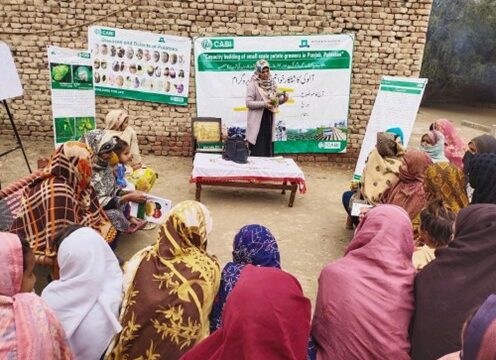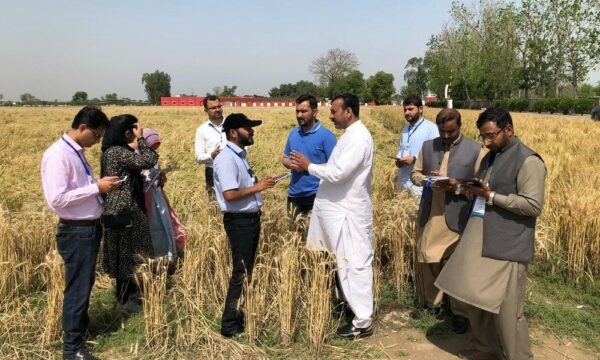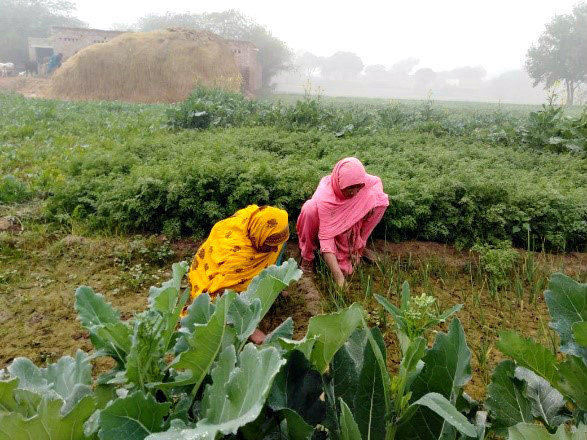
In Pakistan, rural women and youth constitute more than half of the country’s 220 million population and are responsible for multiple roles in different aspects of crop and food production. This blog is published ahead of International Youth Day on Friday 12 August, 2022.
Women, for instance, perform a variety of tasks – working on average 15.5 hours a day – including weeding and tilling land, planting seeds, collecting farmyard manure and harvesting. They are also responsible for cleaning, drying and storing grains.
However, different social and psychological barriers limit their access to opportunities for sharpening their skills to utilise updated technology to produce customer-valued quality potatoes. They are, therefore, neglected of the social and economic benefits of growing healthy and profitable crops and this can cause low self-esteem.
More profitable vegetable value chains
CABI’s potato value chain team – as part of the ‘Strengthening Vegetable Value Chains in Pakistan (SVVCP) project’ – sought to discover if community development activities including nutrition training and kitchen gardening could contribute towards greater smallholder engagement and more profitable vegetable value chains.
Several interventions aimed at raising the awareness of and production of nutritious food resulted in multiple benefits – leading to the active participation of women and youth in participatory training in the major potato growing districts of Punjab, Okra on the value chain approach.
A multi-disciplinary team of social, technical and marketing experts supported farmers in the identification of customer-valued quality potato which could be sold for premium price. Baseline and training needs assessment surveys indicated capacity gaps in production and post-harvest operations, where women farmers and labour are involved.
Unfortunately, women face social barriers to participate in capacity building sessions and experienced very low self-esteem to adopt interventions of the value chain approach. The SVVCP team of social science experts proposed raising awareness of healthy and nutritious food to elucidate its impact on the engagement of women and youth for capacity building of value chain approach.
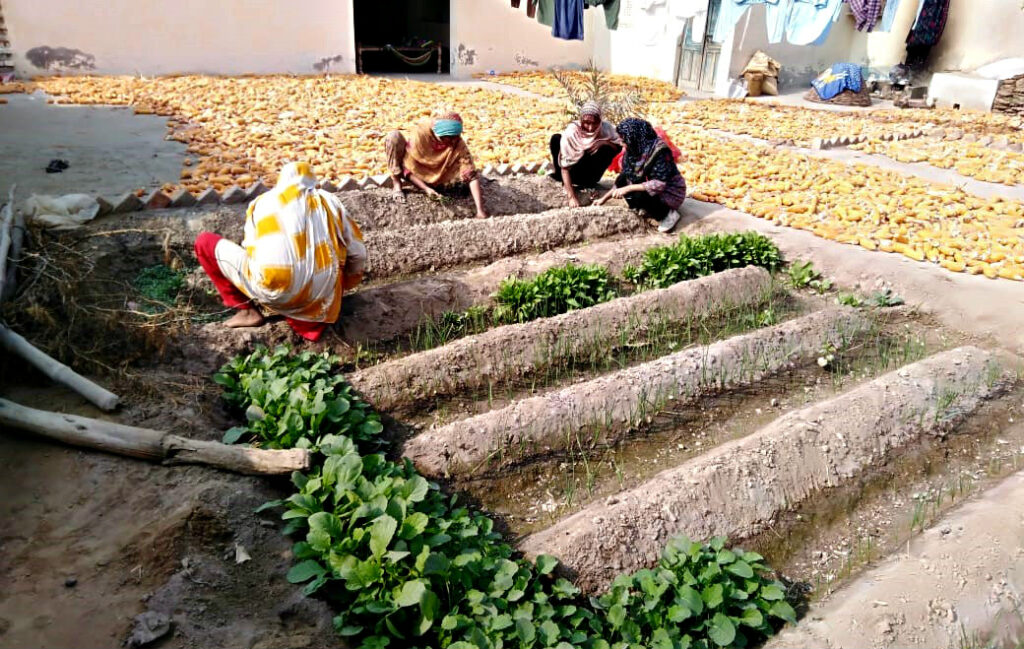
Key interventions
The training highlighted a number of key interventions and benefits including mapping the available resources, (i.e. access), practices and preferences of food in smallholder farm families and influential factors to choose a certain food.
It also looked at constraints and opportunities for women and youth in the production of nutritious food as part of awareness raising of the issue. As part of this, the participants were encouraged to establish kitchen gardening plots to grow safe vegetables for domestic consumption.
Key benefits
Improvement of health and nutrition of farmer families
The women were told that by growing safe vegetables without the use of chemicals at home would improve their health and nutrition as vegetables now became an essential part of their diet.Kitchen gardening saved their time and resulted in fresh and safe vegetables being available for them at any time.
Smallholder farmer, Gojran Bi Bi, said, “Kitchen gardening makes fresh and neat vegetables easily available for us. Sometimes, when we don’t have money, we can take vegetables from the garden and immediately start cooking.”
Inclusion of safe vegetables in diet plan
With harvesting, the women included vegetables from their kitchen gardens in diet plans to provide fresh vegetable to family members on regular basis. One of the potato women, Roshan Bi Bi, said she uses spinach once in a week and radish and carrot daily as salad. She also used, to cook a sweet dish, coriander for garnishing purpose as well as garlic in the cooking of every vegetable. Turnip and radish pods are also used once in a week and fennel seed is used on a need base.
Socio-economic benefits
Before the SVVCP project, the women did not have any interactions with each other. But now they have a platform for sharing issues and good experiences. The project has improved their social links and they gift extra vegetables to friends and other relatives.
Their communication with other female family members has also increased and they give suggestions about how to grow vegetables at their homes. In addition, many of the women saved money from the kitchen gardening to contribute in the education of their children. This helped increase respect in the family and self-esteem to adopt new technology for betterment of their families.
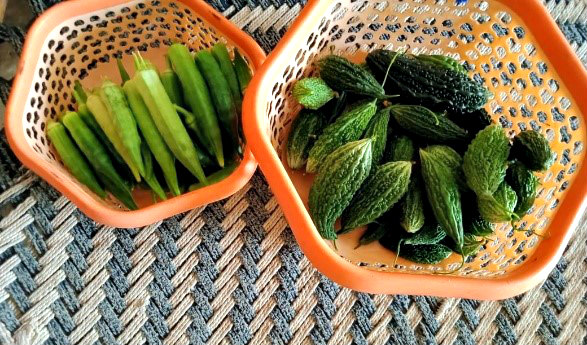
A female farmer leader, Ms Asia, from village 37D, Okara, said, “I am better appreciated by my husband and other family members as saving money and providing a balance diet. I got good economic benefits also. For example, I saved Rs. 13,500 from winter vegetables.”
Popularization the idea of safe vegetables
The potato value chain team arranged the training of smallholder farmers on kitchen gardening as a part of general awareness raising on health nutrition. In the first cycle (summer season 2021), there were two households which established kitchen gardening plots for the production of safe vegetables. Farmers received multiple benefits and shared their success stories with fellow villagers who were inspired to follow them.
In the second cycle (winter season 2021-22), 14 farmers established kitchen gardening plots in their homes/farm houses for safe vegetables after training provided by the Potato value chain team.
Engagement with vegetable value chain
Women farmers and were trained on sorting and seed treatment at the time of sowing. This is important for disease management and good practices of post-harvest operations (sorting and grading of potato) at harvesting. Youth were involved in the record keeping of potato crop. It was noted that the training of women farmers significantly improved the customer-valued quality of potato. This was in terms of better management of skin diseases and uniformity of tuber size required by customers at the time of selling.
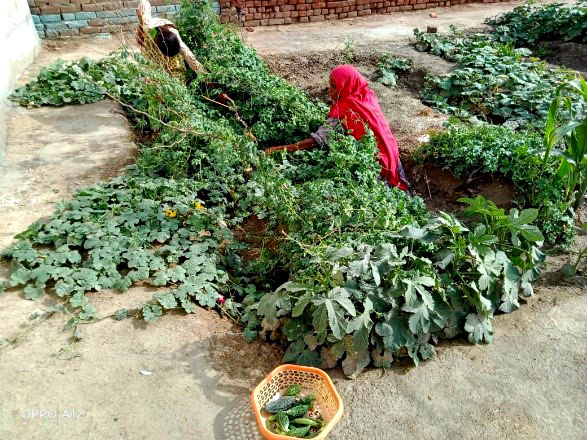
Greater capacity
In conclusion, the training of health and nutrition supported by the SVVCP team made women more aware about essential nutrients required for their family health. The capacity of kitchen gardening to produce safe vegetables also had multiple socio-economic benefits. This inspired many women farmers to adopt the idea of safe vegetables for domestic consumption.
The work was a good opportunity for the improvement of family health under the circumstances where 16% of rural women and 37% of children are underweight due to malnutrition. It also strengthened the self-esteem of women farmers. This allowed them to adopt the innovations and break the social barriers for participation in building sessions on good practices of production and post-harvest management of potato.
Additional information
Photo: Women farmers have established kitchen gardening plots at farm houses (Credit: CABI).
Authors
- Dr Hafiz Mahmood Ur Rehman, Research officer vegetable value chain, SVVCP
- Ms Rahila Ishaq, Social Mobilizer, SVVCP
- Mr Muhammad Asif, Project Manager, SVVCP
Contributors
- Dr Gomathy Palaniappan, Social science expert, University of Queensland
- Dr Zubair Anwar, Social science expert, NARC
- Dr Sajida Shahzad, Social science expert, NARC
- Dr Ximing Sun, Teams Coordinator, SVVCP
- Dr Umair Safdar, Communication Executive, CABI
Donors
Australian Centre for International Agriculture Research (ACIAR)
Partners
- The University of Queensland
- National Agriculture Research Centre (NARC)
- University of Agriculture Faisalabad
- Department of Agriculture Extension (DAE)
- Engro Foundation
Project page
Find out more about how CABI is working to ‘strengthen vegetable value chains in Pakistan’ from the project page.
Related News & Blogs
Revolutionizing crop protection in Pakistan: Registration guidance approved to promote sustainable biopesticides
To celebrate the longstanding achievement in the crop protection sector of Pakistan, CABI organized a dialogue on ‘Regulatory Harmonization in Pakistan for Maximum Residue Limits and Biopesticides’ in Islamabad, Pakistan. The event saw the approval of…
14 February 2024


